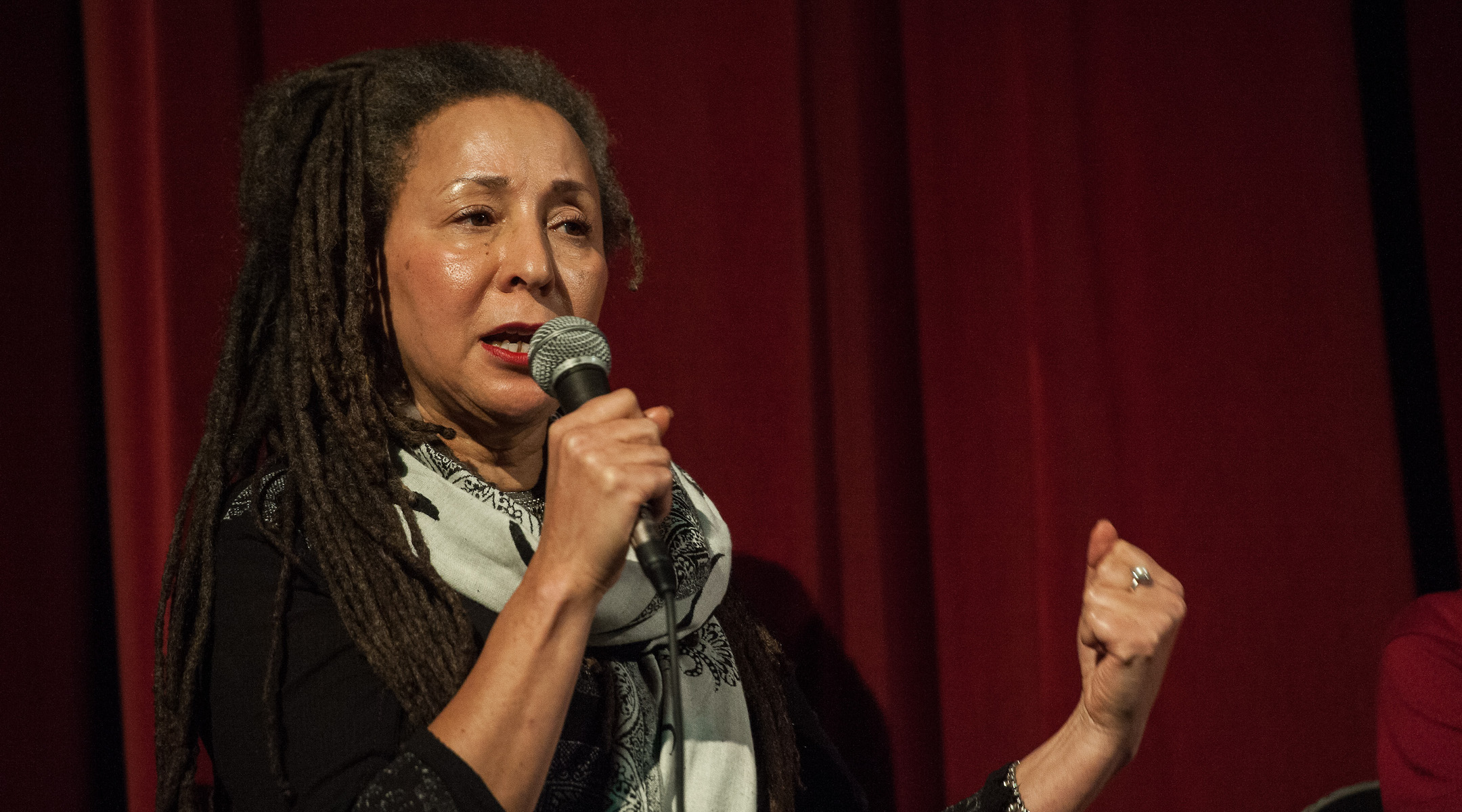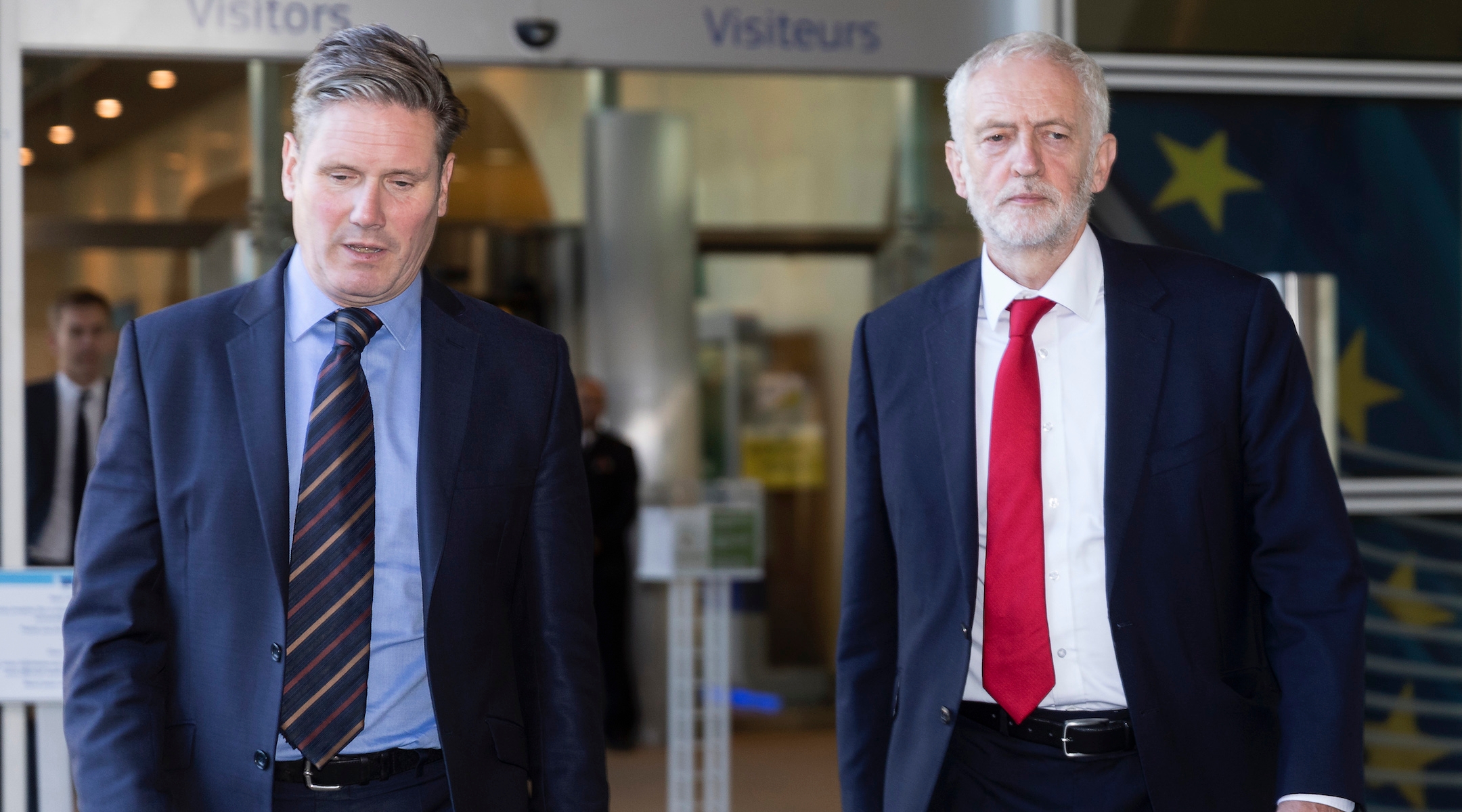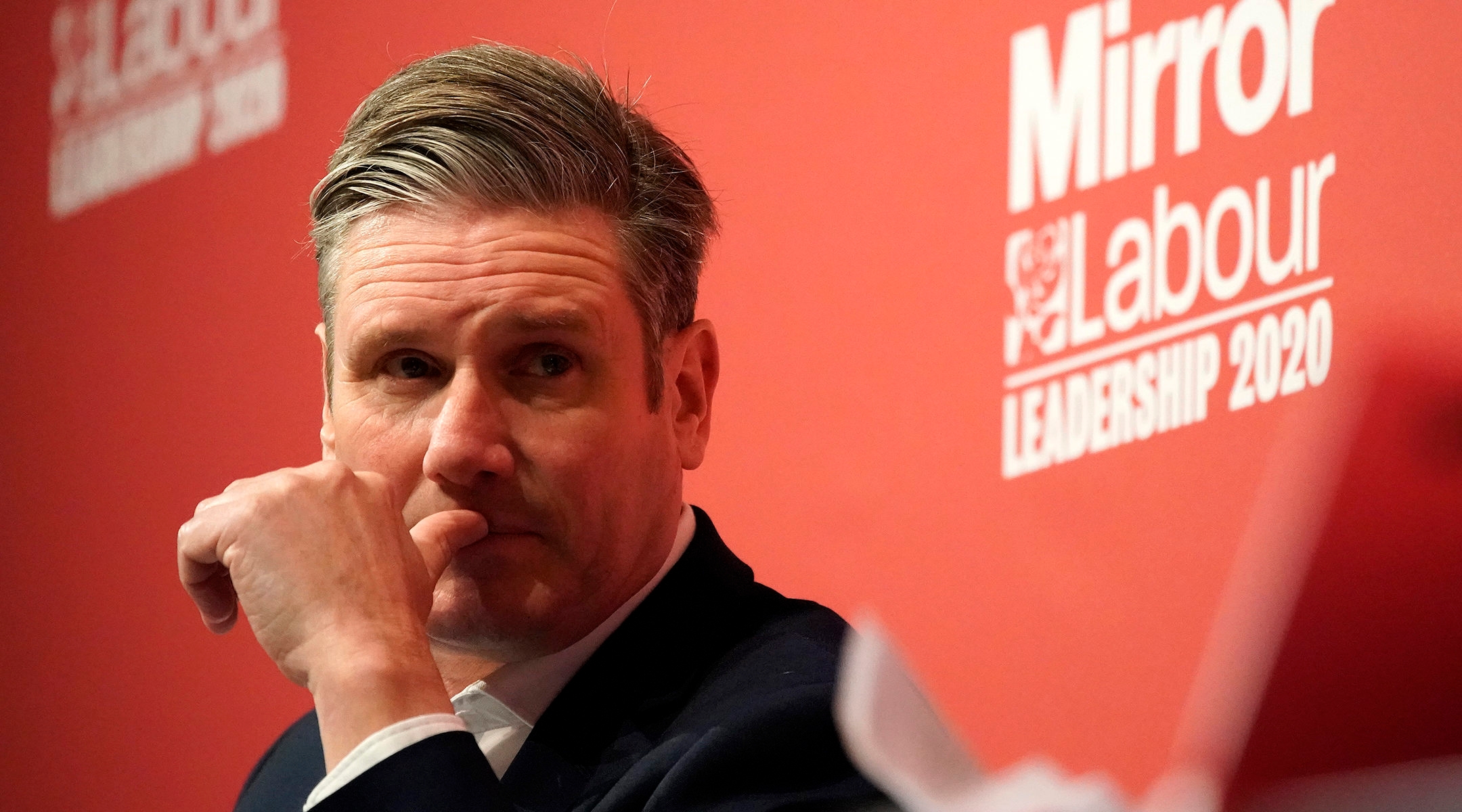(JTA) — New U.K. Labour Party leader Keir Starmer still can’t quite get over the Corbyn hump.
Shortly after his election to head the party a month ago, Starmer promised to implement a zero-tolerance policy on anti-Semitism. For British Jewry, it was a refreshing new start after the last leader, Jeremy Corbyn, left the stain of a years-long anti-Semitism scandal.
But Starmer’s vow has quickly been put to the test, and after a controversial call involving two Labour lawmakers, leading British Jewish organizations now say he is failing it.
First, a few weeks ago, Starmer promoted three lawmakers who have strained relationships with the Jewish community to leadership positions in Labour. Some saw it as a warning sign, while other analysts said the move was needed to stabilize the party in a post-Corbyn landscape.
Then on Wednesday, two of Labour’s most prominent lawmakers — Diane Abbott and Bell Ribeiro-Addy, its previous shadow interior and immigration ministers, respectively — addressed an online meeting that featured well-known activists who have been kicked out of the party over anti-Semitism.
The call, first reported by the Jewish Chronicle, was organized by the pro-Corbyn far-left fringes of Labour under the auspices of a newly formed group called Don’t Leave, Organise (the group’s name is a call to the far left). It included Jackie Walker, who was ousted from Labour in 2019 for numerous negative statements about Jews, including that they were “chief financiers of the sugar and slave trade.”
According to Walker’s website, her father, Jack Cohen, was a Russian Ashkenazi Jew. Last month, she wrote on Facebook that Starmer “only talks to Zionist Jews and the Tories at synagogue.” Starmer’s wife, attorney Victoria Alexander, comes from a Jewish family and has family in Israel. Starmer told the Jewish News that he hoped to travel soon to Israel with their two children.
“I absolutely support the right of Israel to exist as a homeland,” he told the newspaper. “I support Zionism without qualification.”

Activist Jackie Walker attends the premiere of “Witch Hunt,” a documentary film about her suspension from the Labour Party, in London, Feb. 10, 2019. (Guy Smallman/Getty Images)
Also on the call was Tony Greenstein, who is Jewish and was expelled in 2016 over anti-Semitism allegations. He has called Israel “Hitler’s bastard offspring” and helped mainstream the anti-Semitic pejorative “Zio.”
During the call, participants defended Ken Livingstone, a former London mayor who in 2016 said Hitler “was supporting Zionism before he went mad and ended up killing 6 million Jews.”
Livingstone left Labor in 2018 amid pressure to expel him. Ribeiro-Addy and Abbott did not address anti-Semitism during the call, according to the Campaign Against Antisemitism, a major Jewish watchdog that has been at the forefront of the community’s fight with Corbyn.
In his only response about the call, Starmer told the Bury Times that he is “looking” into it.
“What I’ve done since I’ve been leader of the Labour Party is to take the first opportunity to apologise for the way we’ve dealt with anti-Semitism in the party, to build links with the Jewish community, to begin to get to grips with the cases,” he said. “Obviously we’re looking at the circumstances of the meeting last night, but the most important thing is to build that relationship. And I know that’s going to be a difficult thing to do.”

Keir Starmer leaves his London home after being elected the new Labour Party leader, April 4, 2020. (Hollie Adams/Getty Images)
An official Labour Party statement had stronger words.
“The previous comments made by some of the individuals on this call are completely unacceptable,” it said. “These are not people who support the values of the Labour Party. This is being made clear to the Labour MPs who attended the call in the strongest possible terms and they are being reminded of their responsibilities and obligations.”
This didn’t satisfy the Campaign Against Antisemitism.
In its strongest rebuke of Starmer so far, the watchdog group branded Starmer’s handling of the scandal “a failure to discipline” the lawmakers, proceeding in a statement to say it “condemned Sir Keir Starmer for failing to take action.”
Instead of “tearing antisemitism out by its roots, Sir Keir has welched,” Gideon Falter, its chief executive, said in a statement. “Through his inaction he is telling Britain’s Jews loud and clear that his apologies are meaningless, his promises will be broken, and MPs who consort with even the most notorious expelled activists still have a place on the Labour benches.”
The president of the centrist Board of Deputies of British Jews had similar feelings.
“We would urge Labour to take swift and decisive action to show that this is a new era, rather than a false dawn,” Marie van der Zyl wrote in a statement Thursday. She called the lawmakers’ attendance at the meeting “completely unacceptable” even for ordinary members of Labour, much less lawmakers.
Labour Against Antisemitism, a group critical of Corbyn and his legacy, also attacked Starmer.
“His decision to remind the two MPs of their responsibilities is an inadequate measure that fails to meet the standards he agreed to just a few weeks ago,” the group wrote in a statement. By not disciplining the two lawmakers, Starmer “demonstrated a disappointing level of moral and political cowardice.”
Starmer has good reasons to tread lightly. His first weeks as Labour leader have been a walk on a precarious tightrope. On the coronavirus crisis, he has attempted to criticize the ruling Conservative Party while demonstrating solidarity with the government.
On the anti-Semitism front, he has had to balance flushing out the controversy and appealing to the many Corbyn loyalist holdovers.

Starmer, left, with Jeremy Corbyn at the European Union headquarters in Brussels after a bilateral Brexit meeting, Sept. 27, 2018. (Thierry Monasse/Getty Images)
“[If] Corbyn loyalists are made to understand they have no place in Labour under Starmer, that’s simply making sure they’ll misbehave,” one Labour activist told the Jewish Telegraphic Agency earlier this month.
Despite the hiccups, Starmer has taken several strong steps to distance himself from the Corbyn era, and British Jews have noticed.
Four days into Starmer’s tenure, van der Zyl said in a statement that he had achieved “more than his predecessor in four years in addressing antisemitism within the Labour Party.”
Within days of winning the internal elections, Starmer had set up meetings with leaders of major Jewish groups in a stated effort to mend relations that had effectively been frozen under Corbyn.
Starmer has also removed several Corbyn nominees from Labour’s governing body, the National Executive Committee, and demoted Richard Burgon, a Corbyn loyalist who in 2014 said that “Zionism is the enemy of peace.” Burgon was Corbyn’s shadow justice secretary, the party’s point man for the justice portfolio.
“I know that the failure of the Labour Party to deal with anti-Semitism has caused great grief in Jewish communities,” Starmer said in a video greeting for Passover on April 8, in which he apologized for the failing.
“If you are anti-Semitic, you cannot and should not be in the Labour Party. No ifs, no buts.”
JTA has documented Jewish history in real-time for over a century. Keep our journalism strong by joining us in supporting independent, award-winning reporting.






